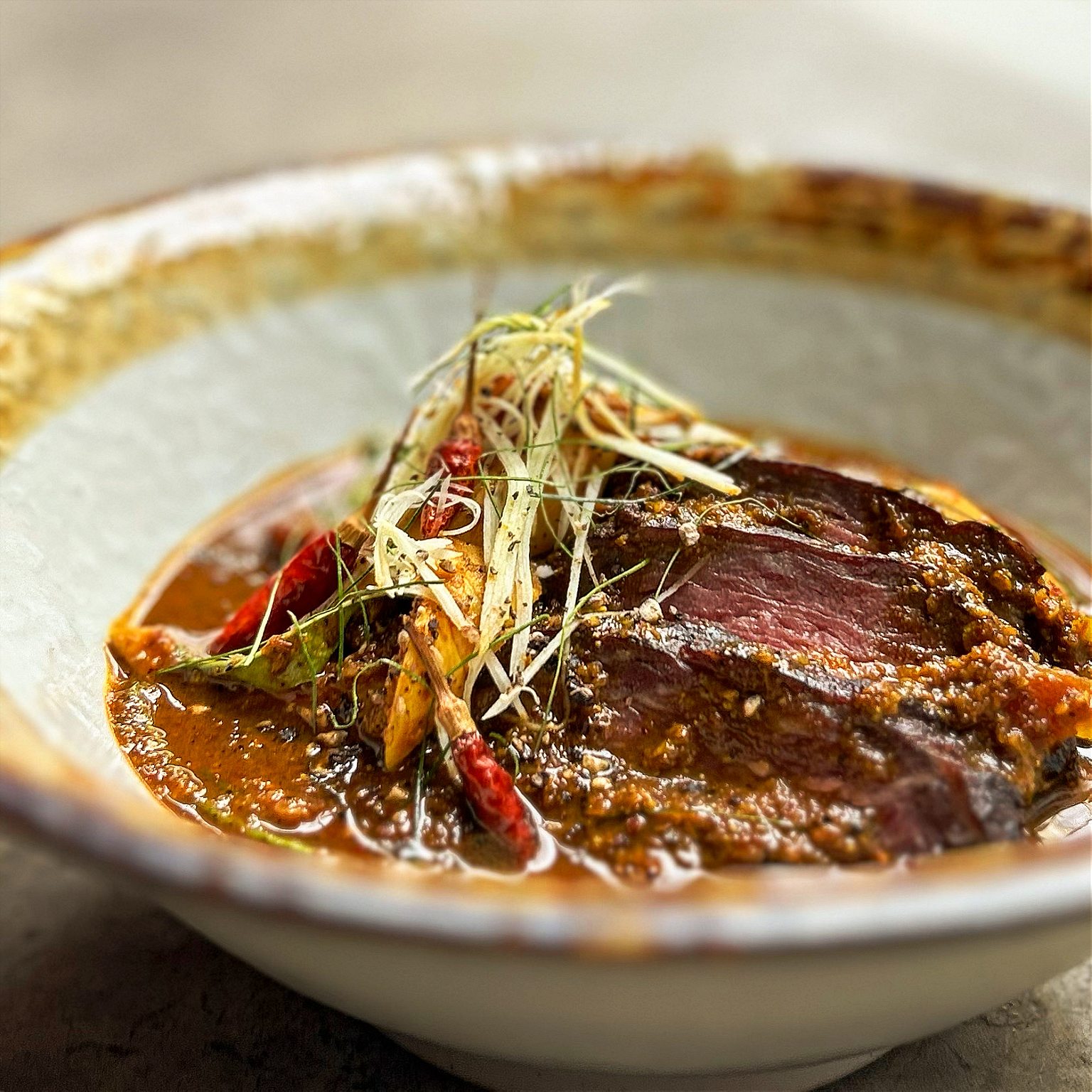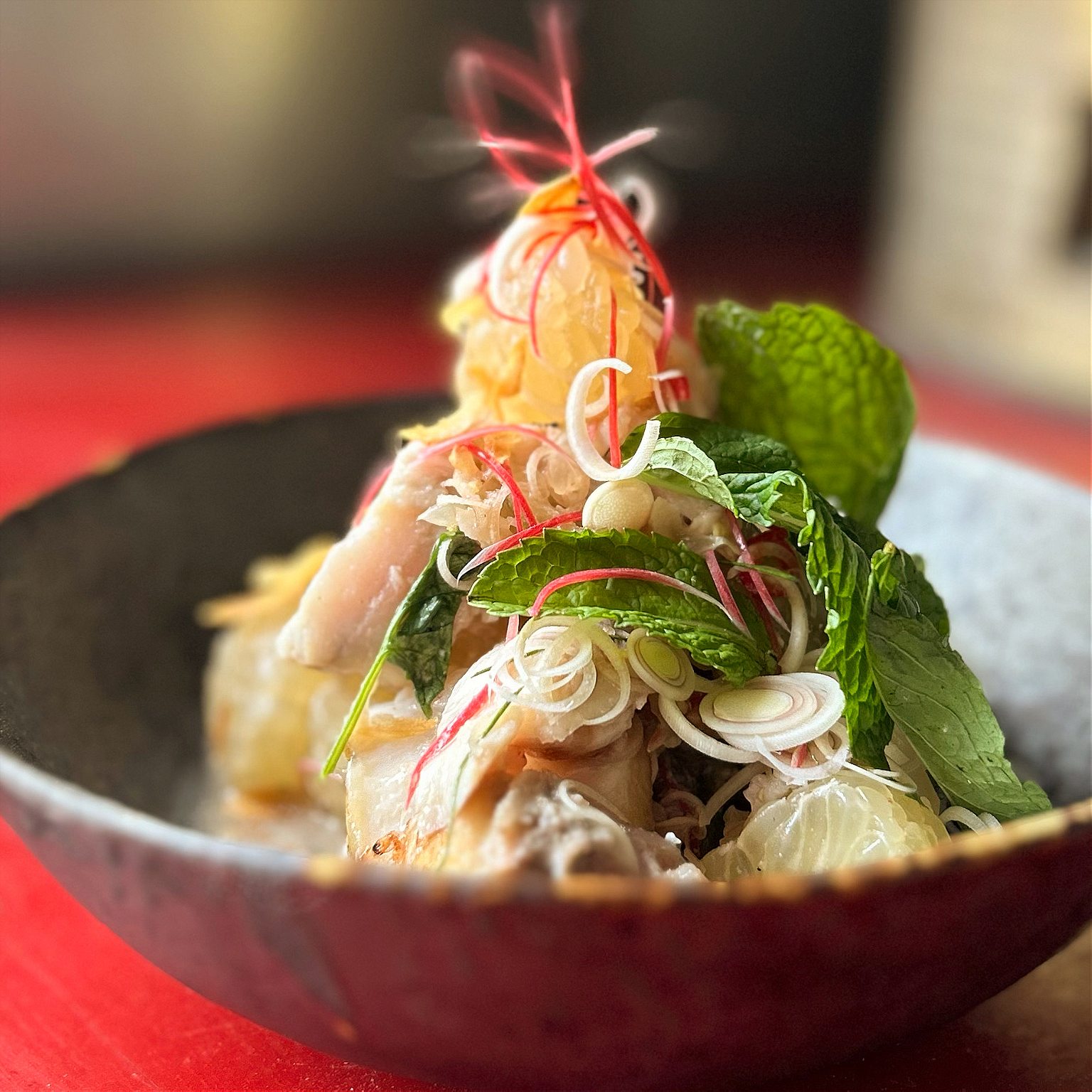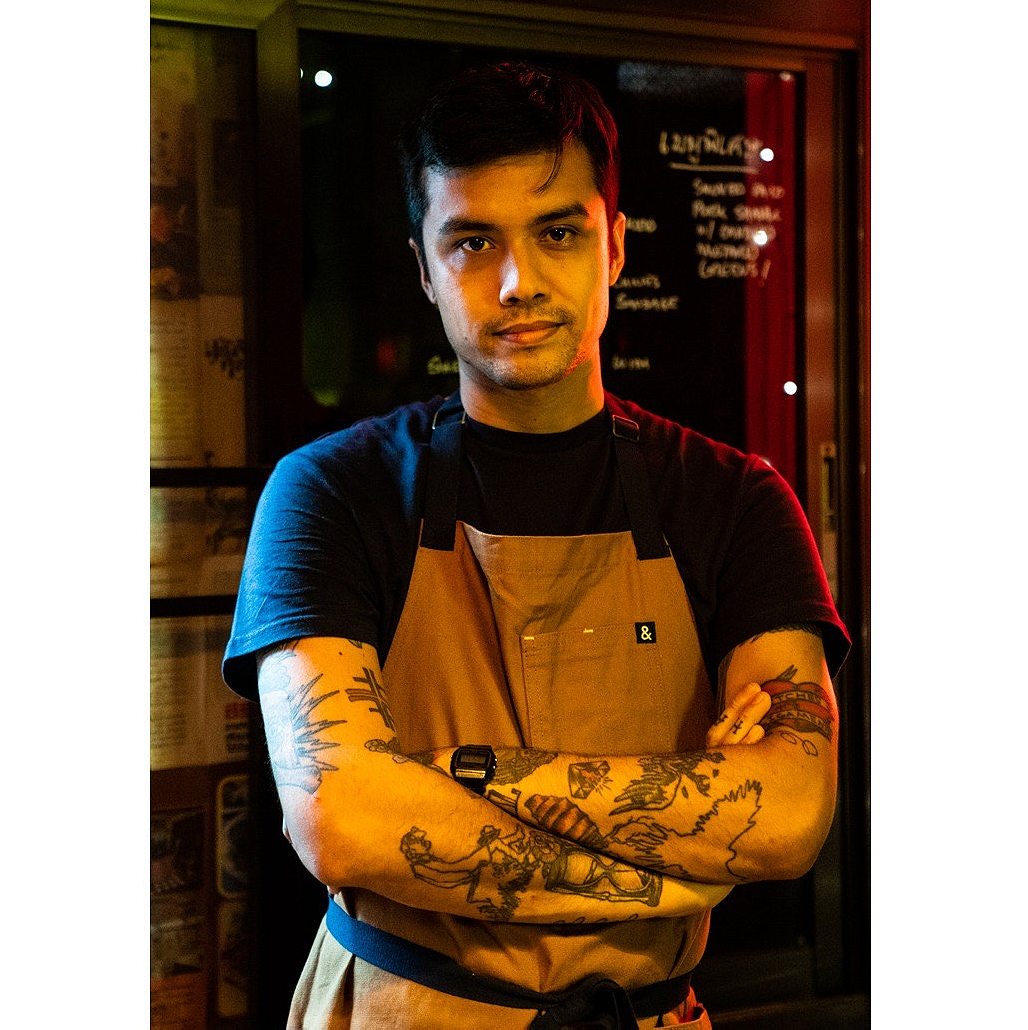In a semi-hidden location in the north of Bangkok, an American-Thai chef has, somewhat improbably, opened one of the city’s most well-regarded restaurants.
In a semi-hidden location in the north of Bangkok, an American-Thai chef has, somewhat improbably, turned the small shophouse where he lives into Haawm, one of the city’s most well-regarded restaurants. Dylan Eitharong, 31, might seem an unlikely new culinary hero in the Thai capital. He’s a Floridian, born in the US to a Thai father and an American mother, and didn’t even grow up speaking Thai. But food connected him to his father’s culture, and that combined with his restless and original mind has led him to craft a tiny 8-seater restaurant which serves an ever-changing prix fixe menu. It’s the stuff that excites the Bangkok diner (not to mention international visitors) and now he’s got a months-long waiting list that you can only book by DM on Instagram.
His food is a mixture of historical recipes, modern techniques and masterful use of the full range of Thai flavors. The result: dishes that are at once deeply Thai, and yet totally new and utterly delicious… a hard trick to pull off indeed. I first met Dylan a few years ago through the chef world, probably via David Thompson, who is a friend and mentor to us both. Dylan’s unique story and singular and uncompromising approach to cooking is part of why I asked him to come north this Fall to join the League of Travelers and cook a private dinner in a beautiful rural setting during our Northern Thailand journey this November. He spoke with me by phone recently to talk about that trip, about the connection between music and cooking, and why he keeps telling people they can’t have the brussels sprouts.
The interview has been edited and condensed for clarity.
Andy Ricker: How did you end up cooking as a profession?
Dylan Eitharong: That was an accident; it wasn’t my life’s plan. It was just a hobby that I had, cooking Thai food. Most of my family on the Thai side, they’re good cooks. At least they were good to me growing up and I liked cooking so I think that for me it was an easy way to connect to the culture since I didn’t have the language. I started doing it at home a lot; I was teaching myself how to cook different Thai dishes and then I started doing pop ups in my house. It started as a noodle shop thing and then one of my friends was like “do you want to do it at my restaurant?” And I said sure, why not. I’d never worked in a restaurant before that but it took off and I kept doing that to get my chops. And yeah, here we are. What? Seven, eight years later.
Andy: You went straight for the thing you’re most interested in without really having to go through all the travails of working in other people’s restaurants for years and years, following their rules. You just did your own thing right from the beginning.
Dylan: Yeah, I got lucky. I’ve always done my own thing.
Andy Ricker: Do you think that’s common in your generation to do it that way? Or do you feel like that yours was a unique path?
Dylan: I think it’s a common thing to do with my generation. I don’t think that the intentions are always good; I think a lot of people just jump into it because they think it’s a cool thing to do. A lot of people don’t stick to it because it’s hard, but this kind of starting point is very common for people my age.
Andy: That’s really interesting to an old dog like me. Perhaps even more interesting is the backstory about your dad, telling you that he didn’t know how to speak Thai early on; that’s an amazing little anecdote. Can you give me a synopsis of that whole scenario?
Dylan: My dad moved to the US 50 years ago, first to California and eventually ended up in Florida. All the family friends have said he decided to be an American guy and to do that he shunned his Thai upbringing. We would go to Thai restaurants when I was a kid and he wouldn’t speak Thai with the service staff and he would tell everyone, including me, that he forgot how to speak Thai. But it turned out that wasn’t true at all. He speaks great Thai. He didn’t return to Thailand until maybe eight years ago, me in tow, and when we got into the taxi from the airport he started speaking Thai… and that was the first time I’d ever heard him speak his native tongue! I have a lot of friends whose parents are the same generation who emigrated to the US and it’s kind of the same…. they just wanted to assimilate. Now that’s less the case, but definitely that generation of immigrants in the US just wanted to be American, putting their past behind them. In retrospect, I could see things about my dad that were very characteristically Thai. Like at home, he would cook Thai food all the time. I think food was the cultural bit that he kept holding onto because it was the part of his Thainess he couldn’t let go of.


Andy: Often what the story ends up being when talking to people in your position is “I grew up in a restaurant and I was around it my whole life and I kind of rebelled against it or was sent away to become an accountant/lawyer/etc ….and then I went back into it to help out the family and now I’m doing it as a second generation restaurateur”, right? But your story is quite different: you didn’t grow up in a restaurant and you weren’t obliged to go and help the family. You just did it on your own. And then you said fuck it and decamped to Bangkok and started doing it here instead of pursuing a career in the USA. Things were going well, undoubtedly you would have killed it there, so why did you decide to leave?
Dylan: Okay, so I was working the pop-ups back in Florida but I was in Thailand every four or five months and, classic story, I met a girl here and I did the long distance thing for a bit and I decided okay, I could move to Thailand, why not right? And at that point I was thinking there’s only so much I can learn about Thai food living in the US. Because my dad is Thai I knew I could get a Thai passport, which would make it easy. I only planned to come for a year, but then Covid happened. So that changed all my plans. Originally the plan wasn’t to cook here for a living because I didn’t think I’d be able to cook Thai food in Thailand, financially. I mean, what I was cooking in the US was street food, like stuff you can get anywhere here for dirt cheap. But I was just gonna move here anyway. I had my aunt’s house available because she moved out and wanted to turn it into an airbnb. She offered to let me move into the house and run the BnB, and I said okay, I’ll teach cooking classes, run the airbnb …..and then that covid thing started. Then there were no tourists and no airbnb to be had. So, I didn’t know what to do. I took a restaurant job for a bit, but me being me (self-taught and only really having worked for myself) I didn’t like to do things anyone else’s way. So I thought, I’ve got this space at home and I could go back to doing pop ups like I had in Florida. I did it once, twice and then by the third one, someone came and they posted in some Facebook group and then it was pretty much non-stop from then on. I was able to quit my job a month later. And it was super!
Andy: And three years on, Haawm is always on the list of the must go places in Bangkok!
Dylan: It’s wild.
Andy: Thai food is a very wide and deep cuisine. How do you see yourself fitting into it? You are doing something that is, to my mind, both very recognizably Thai but also quite innovative. I know that you have studied with Hanuman Aspler and that you’ve spent time studying the works of other people like David Thompson and read the old Thai recipe books, but you’ve also formed your own style. So without forcing you into a box, how do you view what you do?
Dylan: It’s food that reflects myself, I guess. I’m very inspired by older recipes and things like that but I think the cooking here at Haawm represents the things I want to eat.
Andy: Some people have a sour palate, some people tend to have a salty palate, some push the heat or herbaceousness…what do you think your flavor profile is?
Dylan: I like things to be loud!
Andy: Loud. Let’s dig into that!
Dylan: I want every bite you take to be loud. I err on the saltier side of things, smoke also tends to be a flavor I turn to and different textures are something I like to play with. When I’m eating, I want to be like, that’s fucking good! So when I’m making a menu, I want to feel that from everything on the plate. I remember I went to eat with a friend, way back, at some Japanese place in Orlando and we got a couple dishes and I can’t remember what it was, but I found it unremarkable and his comment was “this is supposed to be bland”…..and I didn’t like that. I want everything to be super memorable, to hit your palate strong. My food is like a punk rock song; short, quick and loud.
Andy: Yeah, that’s good. I often have used music analogies to compare with food. The way a restaurant works is kind of like the way a band works and the chef is like the songwriter… maybe you have your greatest hits and they are the ones that are the most memorable to the diners even though it might not be your favorite tune. Do you have a greatest hit? Is there something that’s always on the menu?
Dylan: Yeah, that was the Brussels sprouts. We put them on the menu once early on: deep fried Brussels sprouts with naam plaa waan (sweet fish sauce) because I found brussels sprouts at the market. And it was a great bar snack. Then I couldn’t take it off. But I didn’t want to keep it on because I wanted to do something new…it’s not on anymore!
Andy: That’s common to musical artists too: they record a song or make something that they’re really hyped about but by the time everybody else starts to love it, they’ve moved on. Do people still ask you for the brussels sprouts?
Dylan: It happens every now and then I’m like, please don’t ask me for that. I think of the menu as Guided by Voices songs: short, fast, catchy. I like a menu with all these really good, quick pop hits. Really loud and out there, but it sticks with you. I guess that’s the best way to put it.
Andy: Do you think that being in Thailand and being surrounded by not just the product that’s available but the actual sort of vibe and feel of the city has changed the way that you cook?
Dylan: Yeah, big time. Covid obviously sucked but it did a lot of things for me in that I had all this free time. So I learned to read Thai, which is something I could not do before I moved. I read old cookbooks and started playing with things. And you know what was the funniest thing? Back in the States I always felt very rigid about how to cook Thai food: it has to be done this way or it’s not Thai. But when I moved to Thailand, I knew what Thai food was to me, I knew how I liked things and I stopped caring and started playing with the recipes. Then, having endless access to Thai produce, which Is fucking great, totally changed how I cooked which is what I wanted in the first place. That’s why I moved here; if I had come to Bangkok and ended up doing the same thing as in Florida, I’d have been a bit disappointed in myself.
Andy: You’ll be cooking for the Roads and Kingdoms travelers with me up in Chiang Mai in November. When you go to do something like this, do you just do what you do at Haawm in Bangkok or are you looking to change things up?
Dylan: If I do something once or twice, the seriousness of it wears off in my head, in a good way, and I’m a lot more open to just trying new things and using what’s around me. I’ve cooked in Chiang Mai before, but going up this time I think it’s a bit more exciting because now I know the markets up there. I love wet markets anywhere and Chiang Mai’s are especially great, especially at that time of year and I’m looking forward to just having fun with it!
Andy: It sounds like you’ve been a bit of a restless soul, like you’re always moving, trying new things. Have you thought about moving on from Haawm, from what you do now? Or are you content with where you are?
Dylan: Haawm is what I want to be doing for the foreseeable future. I mean I don’t necessarily want to be doing it in this spot forever. I love the small format but it can be restrictive so maybe I’d move to a new location sometime but wouldn’t want to do anything bigger than the 24 seats Prin Polsuk is doing at Samrub Samrub [ed note: we’ll be ending our Thailand journey with an all-out late-night dinner there]. There is another thing I’m working on: me and my friend Dimitrios Moudios are opening a spot called Kreung, currently a pop up in Bangkok which, unlike Haawm, has an a la carte menu and the whole point of that is to be inauthentic; it’s just fun food, kind of sassy. But Haawm is my baby and this is where I want to be: in front of people and cooking, doing my own thing.
There are still spots available on our the League of Travelers culinary journey to Northern Thailand with Andy, Dylan and more (Nov 26-Dec 3, 2023). Information on how to join on the League homepage.
